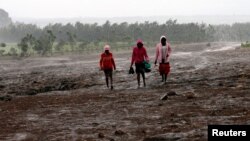Tens of thousands of survivors of Kenya's worst floods in recent years are living on the brink with barely enough food to eat two months after the disaster, aid workers warned on Wednesday, calling on authorities to provide increased funding and support.
Incessant heavy rainfall in March and April caused dams and rivers in parts of the East African nation to overflow, submerging crops and washing away homes. At least 186 people died and more than 300,000 others were forced to flee.
While water levels have receded and many people have returned home, aid workers in the worst affected coastal region of Tana River county said most of those displaced were still living in camps with little means of survival.
"The majority of the 150,000 people displaced in Tana River are still in the camps as they have not received any information from authorities on whether it is safe to return or not," said Matthew Cousins, humanitarian director for Oxfam Kenya.
"They also have nothing to go back to. Their homes and crops have been destroyed and they have not been given any help to rebuild their lives."
After a severe drought last year, East Africa was hit by two months of heavy rains, disrupting the lives of millions of people in Kenya, Somalia, Ethiopia and Uganda.
Kenya experiences two rainy seasons - from March to May and then from October to November - but seasonal rainfall recorded this year has been the highest in 50 years, according to the country's meteorological department.
In Tana River county, the floods not only damaged infrastructure such as roads, bridges and schools, it also submerged swathes of farmland and killed thousands of livestock.
A lack of clean drinking water and poor sanitation in the camps has also resulted in a cholera outbreak with around 300 people contracting the potentially fatal disease, although aid workers said there had been no new cases for over 7 days.
"People need food. They do not have enough to eat. We are registering people in the camps and many children, women and elderly are looking weak and malnourished," said Ahmed Ibrahim, head of the charity Arid Lands Development Focus.
"Some said the last good meal they ate was a chapatti and a cup of tea, that too was two or three days ago. It's a very bad situation and the county appears not to have enough the funds required to support these people."
The Tana River county government said in May it needed around $70 million to help flood survivors rebuild their homes and livelihoods, but aid workers said funds promised by the federal government had not come through.
County officials confirmed there had been a delay in funding from the central government, but said that funds would be provided, adding that people should return home soon.
"I do not know how much of the $70 million we have received, but we haven't received all of it," Salim Bagana, secretary of the Tana River country government, told the Thomson Reuters Foundation.
"There were some delays but now the money is coming and people should be going home. We will help them to restart their lives and we ask our humanitarian partners to also help."








